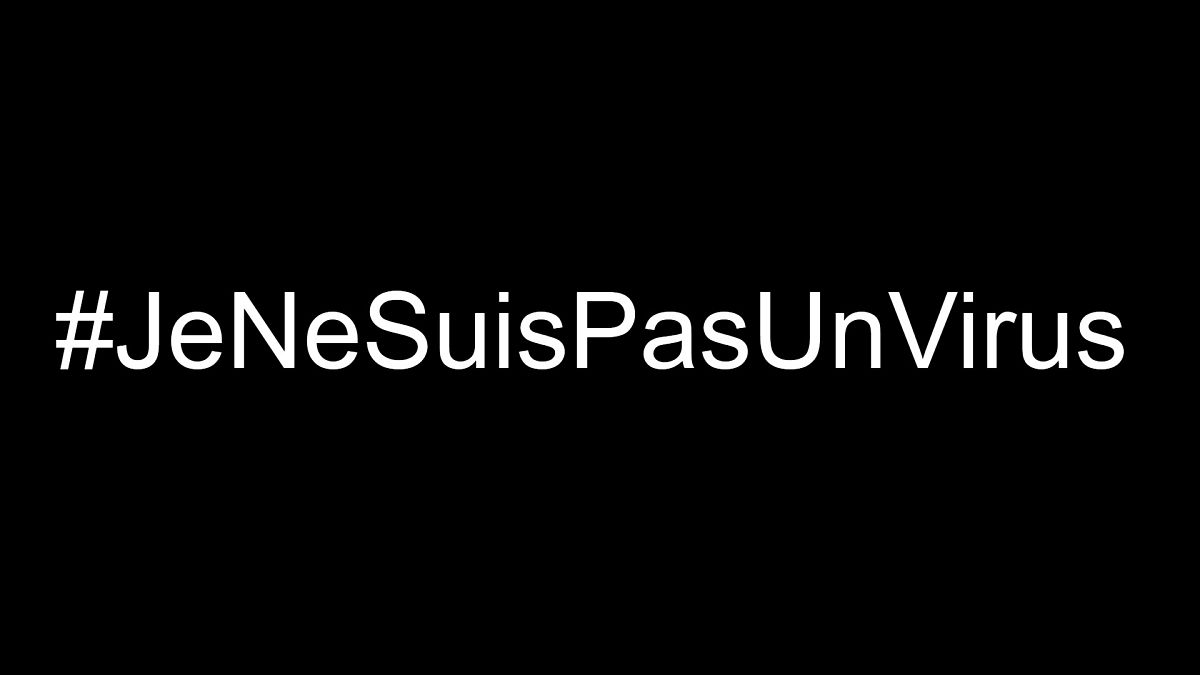Young French-Asians say they are facing an 'epidemic' of racism in the wake of the coronavirus outbreak
A new hashtag has gained popularity in France in recent days as the Coronavirus spread from China to dozens of other countries.
#JeNeSuisPasUnVirus or "I'm not a virus" reflects the increasing frustration of French-Asian citizens, who are facing a new wave of stigma and discrimination in the wake of the epidemic.
This phenomenon is affecting not only citizens of Chinese descent but Asians as a whole. And it's not just happening online but also on public transport and in schools.
"Yes, People are insulted and kicked off public transport because they are Asian. It's not just jokes/hatred on social networks. Discrimination also happens in real life," tweeted French journalist Linh-Lan Dao.
Euronews interviewed Taiwanese sociologist Ya-Han Chuang, a researcher at the National Institute for Demographic Studies (INED) in Paris to understand what is driving the #JeNeSuisPasUnVirus movement.
Deep-rooted discriminations
"This mobilisation is part of a larger movement. Young Asians have been aware of the issue of stereotypes and anti-Asian racism in France for at least 3 or 4 years. The first very large demonstration was in 2016, after the death of Chaolin Zhang".
The Chinese migrant, 49, was beaten to death in 2016 by young people shouting racist slurs in a Paris suburb. They believed he had large amounts of cash with him - a recurring cliché about the Chinese community - but only found sweets and cigarettes.
"Today, many young people are mobilising to denounce stereotypes and clichés about Chinese as discrete, even fragile, and rich people. Since the new coronavirus spread, anti-Asian and anti-Chinese reactions appeared in French media, as well as in international media, in Canada, in England, etc. And faced with this racism, young people shared their experiences and expressed their anger on social networks," Chuang told Euronews.
Sensationalism and fake news
A local French newspaper headlined a frontpage story on coronavirus "Yellow alert," among other examples of sensationalist coverage.
"Expressions such as 'yellow alert' or 'Chinese virus' send a message that all Asian people are necessarily carriers of the virus. But an Asian citizen living in France who has never been to Asia or China, at least not in the past three months, she is no more likely to be infected than a person of another origin."
"I'm a French citizen of Asian origin and I've never set foot in China. I'm not a virus. So stop your anti-Asian racist comments and behaviour" tweeted Sandy, echoing the researcher's analysis.
'Model minority'
Chuang told Euronews that stigma against Asians in France was linked to their image as a "model minority".
"Asians have long been considered a model minority, a hard-working and more successful minority. And this community is often linked to a silent, docile image. It is seen as less serious to joke about Asians [compared to other minorities.¨]"
Many citizens of Asian descent in France come from the former French colonies known as Indochina: Vietnam, Cambodia, Laos.
"Compared to North African countries, there has been much less resistance to French colonisation" coming from this region, the sociologist told Euronews.
"In Algeria, this resistance took a much bloodier turn. Many refugees from Indochina of the first generation had a rather grateful attitude towards the French regime. This in a way euphemised or softened the relations of domination between French society as a whole and these migrants. For a long time, they were considered as a community that was not imposing itself, who was never angry, who did not protest".
Generation gap
Chuang told Euronews that there was a generational gap when it came to racism in the French-Asian community.
"The first generation of Asian immigrants in France is not armed with a critical eye to respond to racist treatment," she said.
"In France, young people of Asian descent - Filipino, Vietnamese, Cambodian or Chinese - consider themselves as French above all. However, they are acutely aware that they have not been considered as truly French since their adolescence. But these young people are 'armed' with the militant know-how and the civic conscience to combat these remarks."
Sinophobia
The expert noted that the image projected by China in the world contributed to fuel misrepresentations.
"The image of China is still very paradoxical. It symbolises both an economic power and at the same time an authoritarian country and a regime far from the democratic practice that exists in France," Chuang said.
When it comes to trade, keywords like 'made in China' often give rise to real sinophobia," the researcher added.
Responding to racism
"We must continue to denounce stigmatising comments in the media or by politicians when that happens," said Chuang.
"In everyday life, when faced with racism, we must learn to respond each time with the law and with humour. And tell people that it's not okay to talk to us like that. Whenever I am insulted, I try to keep cool."
"But there is also a need for educational work in schools and public institutions. People are starting to mobilise but it's coming mainly from activists. On anti-Asian racism, there is still a great deal of work to do to raise awareness."
